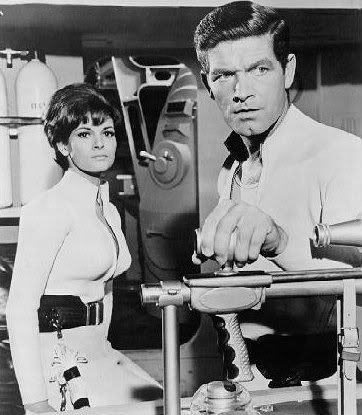What's left of the Fox Movie Channel is showing the fun, if not particularly realistic, Fantastic Voyage, tomorrow afternoon at 1:15 PM. The framing story, which is really a bit of a Macguffin, involves the defection of a Soviet-bloc scientist. It turns out that he knows a lot about miniatuarization. Both the Soviets and the Americans have learned how to miniaturize anything -- including humans -- down to microscopic size. This could be a great weapon, except that to this point, all attempts to control the miniaturization have failed beyond a certain point. They can get things small, but after 60 minutes, everything returns to its original size. The defector, however, has apparently figured out how to control the miniaturization, which would allow the military to shrink things down and then return them to their original size at will. Our Soviet defector has decided to give the information to the Americans, since the Americans are supposedly the good guys and would never do anything wrong with the information. (I suppose I should refrain from all political commentary here.) Before he can do this, however, he's ambushed in a car accident and suffers a blood clot in the brain that threatens to kill him.
The framing story, which is really a bit of a Macguffin, involves the defection of a Soviet-bloc scientist. It turns out that he knows a lot about miniatuarization. Both the Soviets and the Americans have learned how to miniaturize anything -- including humans -- down to microscopic size. This could be a great weapon, except that to this point, all attempts to control the miniaturization have failed beyond a certain point. They can get things small, but after 60 minutes, everything returns to its original size. The defector, however, has apparently figured out how to control the miniaturization, which would allow the military to shrink things down and then return them to their original size at will. Our Soviet defector has decided to give the information to the Americans, since the Americans are supposedly the good guys and would never do anything wrong with the information. (I suppose I should refrain from all political commentary here.) Before he can do this, however, he's ambushed in a car accident and suffers a blood clot in the brain that threatens to kill him.
Ah, but help is on the way. Our scientist's clot would normally be inopreable, but thanks to the miniaturiazation there is in theory a new way to operate on the patient: miniaturize the surgeons, and send them into the brain to do the operation from the inside! Dr. Duval (Arthur Kennedy) is the scientist who is an expert in brain surgery, and is aided by his buxom assistant Cora (Raquel Welch, who is clearly in the picture for one reason). There's a problem, of course, which is that the government isn't so certain about Dr. Duval's political loyalties. So they impress upon one of their security agents (Stephen Boyd) that he has to be part of the operation as security: make certain nobody sabotages it. The doctors are going to get to the clot in a specially designed submarine injected into the carotid artery, and also along for the operation are a second doctor (Donald Pleasance) and a radio man.
The miniaturization aspect of the story is a bunch of hooey, but once everybody gets injected into the defector's circulatory system, the movie really gets visually interesting. Our doctors face a whole host of problems, from the body's immune system to various injuries to the possibility that somebody is trying to sabotage the mission, and have to complete the entire mission in under an hour in order to get out before they start enlarging back to their original size. Some of the medical issues, such as the fact that the immune system really would be likely to attack them, or having to deal with a fistula, really do seem plausible. Other parts of the surgery seem unlikely, but that's always the case with science fiction. The Cold War-era plot may be dated and trite in its attempt to provide extra suspense, but again, the medical aspect more than makes up for that: the movie would be interesting on its own just for the surgical part of it. Fantastic Voyage is an enjoyable enough movie that deftly intertwines suspense with science fiction.
2026 Oscar Nominated Shorts
17 hours ago

No comments:
Post a Comment